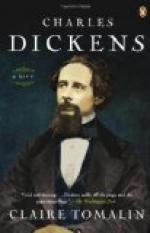For now the end had come. When he went in to dinner Miss Hogarth noticed that he looked very ill, and wished at once to send for a doctor. But he refused, struggled for a short space against the impending fit, and tried to talk, at last very incoherently. Then, when urged to go up to his bed, he rose, and, almost immediately, slid from her supporting arm, and fell on the floor. Nor did consciousness return. He passed from the unrest of life into the peace of eternity on the following day, June 9, 1870, at ten minutes past six in the evening.
And now he lies in Westminster Abbey, among the men who have most helped, by deed or thought, to make this England of ours what it is. Dean Stanley only gave effect to the national voice when he assigned to him that place of sepulture. The most popular, and in most respects the greatest novelist of his time; the lord over the laughter and tears of a whole generation; the writer, in his own field of fiction, whose like we shall probably not see again for many a long, long year, if ever; where could he be laid more fittingly for his last long sleep than in the hallowed resting-place which the country sets apart for the most honoured of her children?
So he lies there among his peers in the Southern Transept. Close beside him sleep Dr. Johnson, the puissant literary autocrat of his own time; and Garrick, who was that time’s greatest actor; and Handel, who may fittingly claim to have been one of the mightiest musicians of all time. There sleeps, too, after the fitful fever of his troubled life, the witty, the eloquent Sheridan. In close proximity rests Macaulay, the artist-historian and essayist. Within the radius of a few yards lies all that will ever die of Chaucer, who five hundred years ago sounded the spring note of English literature, and gave to all after-time the best, brightest glimpse into mediaeval England; and all that is mortal also of Spenser of the honey’d verse; and of Beaumont, who had caught an echo of Shakespeare’s sweetness if not his power; and of sturdy Ben Jonson, held in his own day a not unworthy rival of Shakespeare’s self; and of “glorious” and most masculine John Dryden. From his monument Shakespeare looks upon the place with his kindly eyes, and Addison too, and Goldsmith; and one can almost imagine a smile of fellowship upon the marble faces of those later dead—Burns, Coleridge, Southey, and Thackeray.




